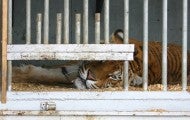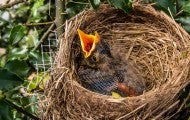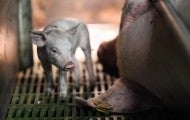Undercover video footage from a recent visit by the Humane Society of the United States at Bill Meadows’ Tiger Safari in Tuttle, Oklahoma, led to a U.S. Department of Agriculture citation for causing animals trauma and stress. The inspection report was made public last week. In March 2021 an HSUS...
Today, the New York state legislature passed a bill that ends inhumane wildlife killing contests, in which participants compete to kill the most, the heaviest and the smallest animals for cash and prizes. In 2018 and 2020, the Humane Society of the United States released undercover investigations...
Around the world, animals used for meat, eggs and dairy often suffer on factory farms where they are treated as units of production rather than living, feeling creatures. The Humane Society of the United States and Humane Society International present comprehensive reports on animal agribusiness and...




